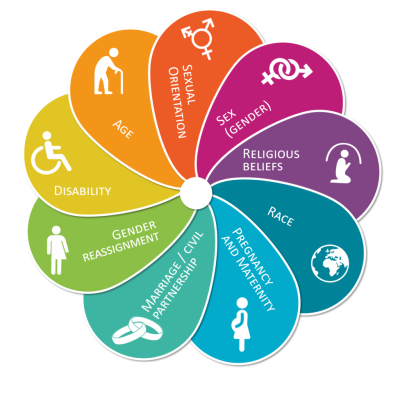Protected Characteristics

At Meadows Primary School and Nursery, we are deeply committed to promoting equality and inclusivity through our curriculum. We recognise the importance of protected characteristics, which include age, race, gender, gender identity, disability, sexual orientation, religion or belief, and socio-economic circumstances.
Our curriculum is designed to ensure that all children feel valued and respected, and are provided with an environment free from discrimination, harassment, and victimisation.
We have integrated the teaching of protected characteristics into various aspects of our curriculum. For instance, our Personal, Social, Health and Economic education (PSHE) and Relationships and Sex Education (RSE) programs are inclusive and age-appropriate, ensuring that all pupils, including those with special educational needs and disabilities (SEND), understand the concept of consent and the importance of respecting others.
Additionally, we have established a meaningful and child-generated 'Superb Unity at Meadows' display in our school library, which includes protected characteristics, religions, languages, origins of staff and children, and British values.
Our commitment to enabling all children to aspire, grow, and flourish is for all in our school family.
We aim to nurture children's growth by providing a supportive and inclusive environment where diversity is celebrated. We continuously review, promote, and improve children's understanding of protected characteristics through our curriculum and extra-curricular activities. By fostering an environment where every child feels secure and confident, we ensure that they are prepared for successful, values-based lives in Modern Britain and beyond.
How do we embed protected characteristics into the ethos of Meadows?
Protected Characteristics run throughout our curriculum, in a variety of meaningful ways.
- Self-esteem, self-knowledge and self-confidence
Our curriculum provides a wealth of knowledge and children learn about and engage in worldwide issues. Children have specific tailored support into self-esteem and self-confidence when this is an area of need identified.
- Understanding that everyone is wonderful and everyone has wonderful talents and attributes
Performances, Celebration Assemblies and 'Out of School' awards celebrate success across the school. Storytime and singing assemblies allow us to explore a range of themes. We acknowledge and celebrate successes.
- Respect for democracy and support for participation in the democratic process
Elections held across classes for representatives for School Council (Y2-6) and Safeguarding Squad.
- Acceptance of responsibility for their own behaviour and teaching children to make good choices
Safeguarding Squad – familiar faces across the school and supporting all. Our robust 'supporting excellent behaviour' policy clearly lays out our expectations for excellent behaviour.
- Respect for their own and other cultures
Whole school RE coverage, as well as themes of respect through our PSHE lessons.
Recognition of religious festivals and celebrations across the school year.
- Every member of the community knowing that whatever they report it will be dealt with appropriately and followed up
Our Helping Hand, Worry Button, residential experiences, talks from the fire department and the police, use of services to support individuals requiring more assistance, Online Safety Day and more are just some examples of how we support children in knowing concerns will always be dealt with.
- Understanding of how they can contribute positively to school and home life and to the lives of those living and working in the locality and further afield
Support for the local food bank and money raised for other charities throughout the year. Understanding our 'superb unity' - we are a family.
- An appreciation that living under the rule of law protects individual citizens and is essential for their wellbeing and safety
Understanding of democracy – modelling within school as part of our Meadows Expectations, our Meadows Expectations and British Values all play an integral role in creating a harmonious school environment.
- An understanding that the freedom to choose and hold other faiths and beliefs is protected in law
Faiths taught through RE, and constant reminders during lessons that everyone’s religion is to be respected and appreciated.
- An acceptance that other people having different faiths or beliefs to oneself (or having none) should be accepted and tolerated and should not be the cause of prejudicial or discriminatory behaviour
Modelled and taught within RE lessons and whole school assemblies. Any prejudiced incident that takes place at Meadows is seen as an opportunity to reflect, learn and make better choices next time. Restorative conversations guide this.
- Parents taking an active part in identifying barriers and informing school leaders of actions that can be taken to eradicate these
Many opportunities for parent communication including our consistent, open door policy, use of ClassDojo for communications, children's progress evenings, parent and carer questionnaires and more.
How do we support children with SEND in understanding protected characteristics?
We are dedicated to supporting children with special educational needs and disabilities (SEND) in understanding protected characteristics.
Here are some of the ways we achieve this:
Tailored Support: We provide specific tailored support to enhance self-esteem and self-confidence when identified as a need by our team..
Inclusive Activities: We organise inclusive activities such as Christmas performances, celebration assemblies, storytime, and singing assemblies to celebrate success and acknowledge the wonderful talents and attributes of every child.
Democratic Participation: We hold elections across classes for representatives for School Council (Y2-6) and Safeguarding Squad (Y3-6). Year 6 students also take on responsibilities as Peer Mentors and Meadows Ambassadors..
Training and Workshops: We offer training sessions and workshops, such as the Picture News training on British values and protected characteristics, to provide pupils with an added dimension of understanding.
Assemblies and Meetings: We hold assemblies and staff meetings to discuss and share information about protected characteristics. For example, we have hosted a staff meeting delivered by Andrew Moffat on 'No Outsiders' to support teachers in delivering materials on protected characteristics.
Celebration of Awareness Weeks: We celebrate Autism Acceptance Week, Tourette’s Awareness Month, Neurodiversity Celebration Week and others to encourage disability awareness and inclusivity.
By integrating these strategies into our curriculum and school activities, we ensure that children with SEND are supported in understanding and respecting protected characteristics, fostering an inclusive and supportive environment for all.


